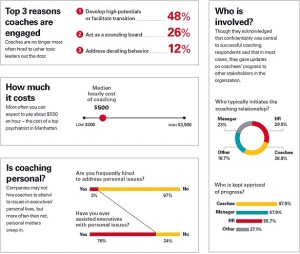Michael Jordan had Phil Jackson.
Steve Jobs had Bill Campbell.
Meg Whitman had John Thompson
High performers in any field typically have a coach or mentor to help guide their major decisions. Several times in my career, I have found value in a business coach both for myself and the senior executives that reported to me.
Eric Schmidt, Chairman and CEO of Google, said that his best advice to new CEOs was “have a coach.” Schmidt goes on to say “once I realized I could trust him [the coach] and that he could help me with perspective, I decided this was a great idea…”
What value do coaches provide?
- An Outsider’s Perspective – Too often, CEO doesn’t feel comfortable speaking with their staff, board or spouse about certain work challenges. A seasoned executive as a business coach provides a perspective that CEOs needs to feel confident about their potential solutions to specific problems.
- Experienced Counsel during Major Change – Coaches often bring a wealth of experience to assist a company’s major change initiatives. Given that a number of them do not succeed, CEOs who utilize a Coach with pertinent experience will manage the process better.
- Talent Development – Coaches are consistently used to develop the potential of high performers within an organization. Paul Michelman, writing in the Harvard Business Review Working Knowledge, has found that most major companies now make coaching a core part of their executive development programs. These companies have come to understand that one-on-one personal interaction with an objective third party can provide a focus that other forms of organizational support can’t.
- Help to Fix Negative Behavior – CEOs and senior leaders often have behavior traits that need modification. David Dotlich and Peter C. Cairo, in their book, Why CEOs Fail: The 11 Behaviors That Can Derail Your Climb To The Top And How To Manage Them, present 11 reasons why leaders fail. Most relate to ego or a lack of emotional intelligence. Experienced coaches help mentor change within a strong CEO or senior leader.
These graphs from 2009 research performed by Diane Coutu and Carol Kauffman and published in the Harvard Business Review show the efficacy of business coaching.
Given today’s high-pressure environment, leaders need a mentor or confidante they can trust to tell them the truth about themselves and their behavior … and help them maximize opportunities.
Why do a significant number of new CEOs fail?
In the past two decades, 30 percent of Fortune 500 CEOs have lasted less than 3 years. Top executive failure rates as high as 75% and rarely less than 30 percent. According to the Harvard Business Review, two out of five new CEOs fail in their first 18 months on the job.
One widely regarded reason is the gap between how leaders see themselves and how others see them. Call it self-awareness … these blind spots are often career limiting. The wider the gap, the more resistance there is to change. It also makes it difficult to create a positive culture in the organization where openness and honesty are non-existent.
What you should look for when hiring a coach?
Look for someone that understands your situation or industry and has a methodology that is proven effective. I’ve become affiliated with the Gazelles System of coaching that utilizes the Rockefeller Habits. Verne Harnish created the “Rockefeller Habits” based on the leadership and management principles used by John D. Rockefeller, founder of Standard Oil and the world’s first billionaire. The Gazelles System is a proven methodology that has helped thousands of companies over the last ten years.
The greats from all walks of life use a coach to get even better. I’ve worked with dozens of executives and helped many of them become multimillionaires. Read about some of our successful engagements here.
If you want to better understand how a coach might help you or your organization, please call or email me to discuss it.
